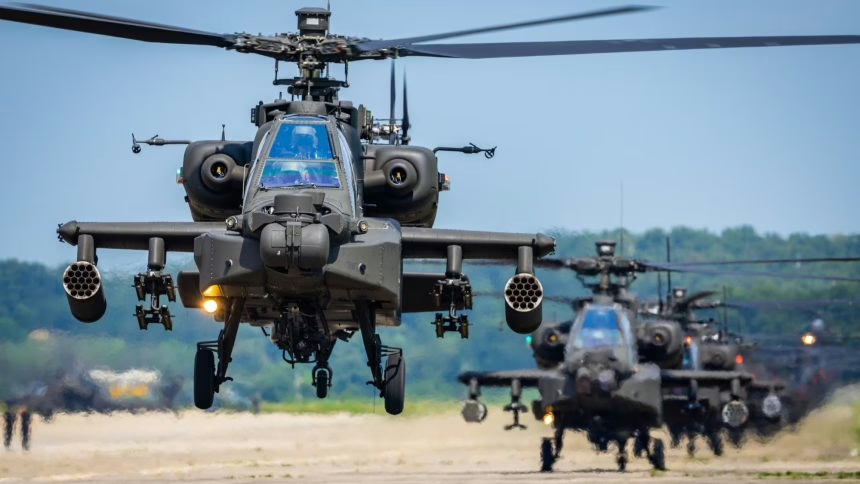Defense officials cut funding for additional Boeing AH-64E aircraft as military reviews role of attack helicopters in modern warfare
South Korea has moved to cancel its order for 36 additional Boeing AH-64E Apache attack helicopters following significant budget cuts, as the country reassesses the effectiveness of crewed helicopters in contemporary combat operations.
The National Assembly’s recently passed supplementary budget slashed funding for the project from $7.3 million to $217,880, according to opposition lawmaker Yoo Yong-won of the People Power Party. The remaining funds will be redirected to other defense initiatives.
The decision comes nearly a year after the U.S. approved the sale of up to 36 helicopters to South Korea in a deal worth approximately $3.5 billion. However, South Korea began reviewing the purchase earlier this year after the U.S. State Department reportedly set the price higher than expected.
In May 2025, South Korea’s Joint Chiefs of Staff formally decided to review the order and consider alternatives, including manned-unmanned teaming systems and drone-based platforms. The country’s Ministry of Defense has expressed concerns about the rising cost and operational efficiency of expanding the Apache fleet.
Officials noted that shifting battlefield dynamics, particularly lessons learned from the Russia-Ukraine war, have raised questions about the role of attack helicopters in modern combat. Yoo Yong-won called the order review a “positive development,” highlighting the U.S. Army’s shift away from Apaches in favor of unmanned systems like the MQ-1C Gray Eagle.
Defense Spending Realignment
The original deal was announced by South Korea’s Defense Acquisition Administration in 2021, with 3.2 trillion won ($2.3 billion) allocated for purchasing the helicopters. The acquisition would have built upon the country’s first Apache purchase, completed in 2017.
The initial $1.6 billion deal included 36 AH-64Es, Hellfire missiles, Stinger MANPADS, crew training, and support systems. In August 2024, the U.S. State Department approved the sale of 36 additional helicopters to South Korea.
The expanded deal would have included 76 GE Aerospace T700 engines, plus four spares, with each helicopter receiving its own AN/ASQ-170 Modernized Target Acquisition and Designation Sight. The acquisition would have brought South Korea’s Apache fleet to 72 aircraft, replacing aging AH-1S Cobras in Army service.
South Korea’s current AH-64Es are equipped with Longbow radars, digital fire control, and systems for integration with unmanned platforms like the RQ-7 Shadow. The helicopters also feature missile warning and countermeasure systems for operations in contested airspace.
Boeing Defends Apache Capabilities
Boeing has acknowledged the rising prominence of drones in modern warfare but emphasized that unmanned aerial vehicles cannot fully replace crewed aircraft. Christina Upah, Boeing’s Vice President of Attack Helicopters, said the Apache is the most powerful attack reconnaissance helicopter in existence, “with top-tier performance and reliability.”
She added that the aircraft will remain critical in future battlefields, not just in today’s environments. According to Boeing, there are over 1,280 AH-64 Apache aircraft in operation worldwide. The helicopter will be in production until at least 2028 and is expected to serve the U.S. Army and partner nations into the 2060s.
The manufacturer attributed the “high price” to additional provisions, including training, weapons systems, and support packages, under the U.S. government’s Foreign Military Sales program.
Continued Cooperation
Despite the order review, South Korea will continue cooperating with Boeing on Apache programs. Korea Aerospace Industries (KAI) has reportedly signed a contract to produce fuselages for the AH-64E, indicating ongoing partnership between the two nations’ defense industries.
The cancellation reflects broader questions about traditional military platforms’ effectiveness in modern warfare, as demonstrated by conflicts in Ukraine where drones and portable missile systems have proven particularly effective against helicopters and other conventional aircraft.
South Korea cited both the high price and shifting battlefield dynamics as factors that have left attack helicopters increasingly vulnerable to drones and portable missile systems in contemporary combat scenarios.

Key Takeaways
- South Korea canceled its $3.5 billion order for 36 additional Boeing AH-64E Apache helicopters after budget cuts reduced project funding from $7.3 million to $217,880.
- The decision follows concerns about rising costs and battlefield lessons from the Russia-Ukraine war that highlight attack helicopters’ vulnerability to drones and portable missiles.
- South Korea’s military is reviewing alternatives including manned-unmanned teaming systems and drone-based platforms as traditional helicopter roles are questioned.
- Boeing defends the Apache as the most powerful attack reconnaissance helicopter, with over 1,280 aircraft in operation and production continuing until 2028.
- Despite the cancellation, South Korea will maintain cooperation with Boeing through Korea Aerospace Industries’ fuselage production contract.



